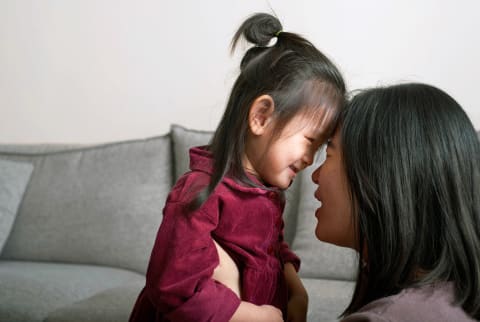Advertisement
This Might Be The Key To Helping Your Kid Deal With Social Anxiety


We've all dealt with our fair share of social anxiety—say, getting sweaty palms before reading out loud in class—but for some, emotional distress is constant and debilitating. Personal relationships and emotions can be extremely difficult to manage or maintain under such pressure. Research shows 80 percent of kids have diagnosable anxiety disorders, and yet parents are often in the dark in terms of what to do to help them cope. Helping a young child face their social anxiety can feel like an impossible task—many adults can hardly deal with it, let alone a 9-year-old without the years of experience facing these challenges.
Fortunately, new research suggests there may be a few specific skills we can teach our kids at a young age to help them deal with this social anxiety. The most important of them? Being able to describe their internal experiences.
A recent study1 from Personality and Individual Differences surveyed students between the ages of 12 and 15 to measure their levels of emotion "dysregulation," which included things like lack of impulse control under emotional stress, lack of emotional regulation strategies, difficulties focusing on goals under emotional distress, having trouble naming and explaining emotions, and lack of awareness about one's feelings. The researchers also asked questions to assess their levels of mindfulness, including their ability to be aware (avoiding distractions and being consciously engaged), observe (noticing sensations around you), describe (having the ability to put experiences into words), avoid judgment (being comfortable with accepting negative emotions), and avoid reactions (acknowledging inner emotions but not immediately reacting to them).
The findings truly demonstrate the power of expressing emotions: Having the ability to describe what you're going through internally led to having less social anxiety. The two biggest things that added anxiety symptoms were the lack of strategies to regulate your emotions and the tendency to be hypervigilant of your emotions—as in, being overly in your feelings.
Having emotions is tough, but for a child who doesn't have the words to even describe those emotions, it can feel doubly overwhelming. We know journaling is a trusted method of coping with stress, and that's because it feels good to be able to at least pinpoint what you're going through and say it out loud. Just being able to say, "I feel sad, and here's why" releases you from being controlled by your feelings. Likewise, many adolescents have yet to develop concrete strategies for what to do when they encounter these foreign, negative emotions for the first time, and so they just end up sitting in those emotions and feeling like there's no escape.
For parents with particularly anxious children, these findings offer a few clear strategies for helping their kid deal with that anxiety: (1) teaching them how to put words to those emotions, (2) equipping them with strategies for dealing with negative feelings when they come up, and (3) helping them learn how to not get caught in a fog of emotion and end up lost in there.
There are exercises that will help with each of these tasks (the above hyperlinks are a great place to start!), but the biggest overarching lesson should be to constantly teach your children the beauty of mindfulness: Kids should be able to recognize their emotions without being completely overwhelmed by them. Encourage them to share their feelings about negative situations and work through it with them by using ways you cope with your own stresses. With this plan, the entire family unit can be ready for whatever life throws at them.
Watch Next
Enjoy some of our favorite clips from classes
Enjoy some of our favorite clips from classes
What Is Meditation?
Mindfulness/Spirituality | Light Watkins
Box Breathing
Mindfulness/Spirituality | Gwen Dittmar
What Breathwork Can Address
Mindfulness/Spirituality | Gwen Dittmar
The 8 Limbs of Yoga - What is Asana?
Yoga | Caley Alyssa
Two Standing Postures to Open Up Tight Hips
Yoga | Caley Alyssa
How Plants Can Optimize Athletic Performance
Nutrition | Rich Roll
What to Eat Before a Workout
Nutrition | Rich Roll
How Ayurveda Helps Us Navigate Modern Life
Nutrition | Sahara Rose
Messages About Love & Relationships
Love & Relationships | Esther Perel
Love Languages
Love & Relationships | Esther Perel











